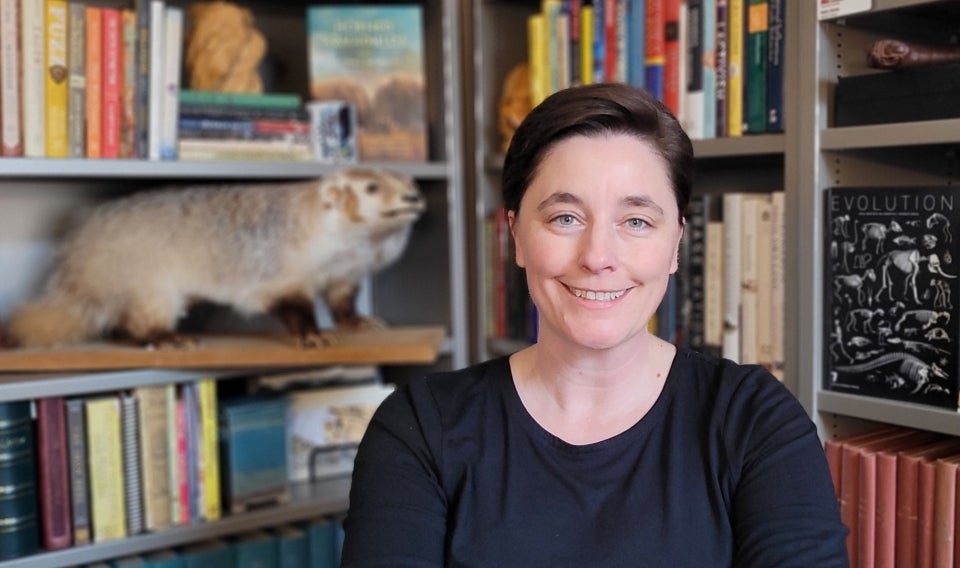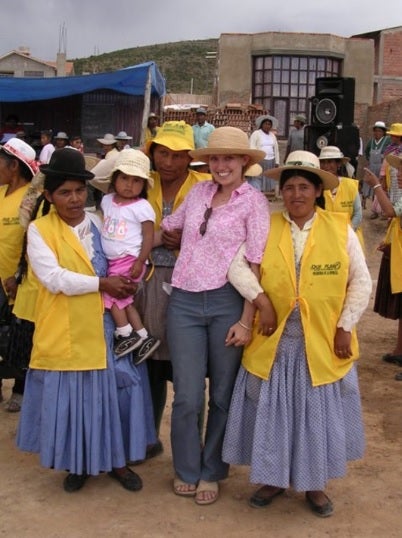AAAS honors 2 ASU anthropologists as lifetime fellows

Katie Hinde (left), associate professor at the School of Human Evolution and Social Change, and Amber Wutich, President’s Professor and director of the Center for Global Health, were recently named fellows of the American Association for the Advancement of Science.
The American Association for the Advancement of Science (AAAS), the world’s largest general scientific society and publisher of the Science family of journals, has elected Arizona State University anthropologists Katie Hinde and Amber Wutich to the newest class of AAAS Fellows, among the most distinguished honors within the scientific community.
Katie Hinde
Hinde is an associate professor at the School of Human Evolution and Social Change, a core faculty member at the Center for Evolution and Medicine, an associate professor with the Global Biosocial Complexity Initiative, School of Life Sciences interdisciplinary graduate faculty and a senior global futures scientist with the Global Futures Scientists and Scholars Network.
She is being honored for “distinguished contributions to the study of evolution of mothers’ milk, gendered experiences in science and public outreach of science,'' according to a release from the AAAS.
“I cannot overstate how much this fellowship means to me," Hinde said. “As a biological anthropologist working at the intersection of the life and social sciences, the ‘big tent’ of the AAAS has been exceptional at inspiring me to think about the connections we can make and the impacts we can have as scientists. Not only does the AAAS bring scientists together, but the organization is dedicated to engagement with policymakers, collaboration with public communities and development of transformative programs like the Dialogue on Science, Ethics, and Religion.”
Throughout her career, Hinde has received numerous awards and honors. She has developed original content reaching both academic and general audiences regarding her studies on mothers’ milk and celebrating science through storytelling. Her TED Talk has been translated into 31 languages and is used by ministries of health in other countries.
Hinde has studied the food, medicine and hormones of mother's milk in multiple species of mammals, including differences in milk for sons and daughters and how mother's milk influences infant behavior in monkeys. By organizing large collaborations among anthropologists and biologists, Hinde has explored how global variation in human cultural practices show up in the composition of human breast milk. Combining an evolutionary lens with a social science sensibility, Hinde has worked in her publications and public engagement to translate findings from the bench to the bedside. Her interest in the topic started as an undergraduate student.
ASU Associate Professor Katie Hinde is being honored for “distinguished contributions to the study of evolution of mothers’ milk, gendered experiences in science and public outreach of science,'' according to a release from the AAAS. Photo courtesy Katie Hinde
“At the time, there had only been two studies ever on individual differences in milk composition among primates from an evolutionary perspective, and I just kept having questions,” Hinde said. “Pretty soon it became clear that if I wanted answers to my questions, I would have to tackle the research myself. And those spark questions I had as an undergraduate, writing notes in the margins of my class-assigned readings, were the foundation for my PhD research and have framed my career for two decades.”
Hinde is also frequently recognized for her public outreach, including activities such as March Mammal Madness. As the founding director of the collective effort, Hinde and her collaborators work together to merge science with storytelling, working to make science attainable through weaving it into the narrative of the game.
“I think the mandate of 21st century science is that we not only pursue our scholarly curiosities, but that we engage communities too long excluded from celebrating science and that we forge a better academy to welcome the young scientists we inspire,” Hinde said. “To be recognized for achievement in all three of these is meaningful to me personally, but even more, this speaks of a broader promise within our scientific community.
Amber Wutich
Wutich is a President’s Professor at the School of Human Evolution and Social Change and director of the Center for Global Health at ASU. She is also associate director of the Institute for Social Science Research and a senior global futures scientist with the Julie Ann Wrigley Global Futures Laboratory.
Wutich is being honored by AAAS for “distinguished contributions to the field of environmental ecology, water resource use and global mental health issues, particularly using advanced cross-cultural research methods,” they announced in a release.
She is an expert on water insecurity and knew at the start of her career that she wanted to focus on water scarcity. What surprised her over the decades is the connection between mental health and water scarcity.
President's Professor Amber Wutich in the field with Bolivia Community Partners. Photo courtesy Amber Wutich
“The pivotal moment came when I was working in Bolivia on informal water systems, like water sharing or bartering, after the Cochabamba Water War,” Wutich said. “I thought I’d help solve water delivery problems, but people told me I really ought to be asking them about their feelings: how distressing, angering and worrying water scarcity was for them. That’s when my career in global mental health took off, and it wasn’t something I planned or trained for at all.”
Wutich’s career includes numerous awards and honors. She has done extensive fieldwork, raised millions of dollars in research funding and has published numerous articles and books on her work looking at health through a nuanced, anthropological and cross-cultural lens.
Wutich and co-author Alexandra Brewis, President’s Professor with the School of Human Evolution and Social Change, released their award winning book “Lazy, Crazy, and Disgusting: Stigma and the Undoing of Global Health” in 2019. In the book, Wutich draws on her experiences working with people living with inadequate sanitation in places like South America and the U.S.-Mexico border to uncover the stigmas associated with these living conditions and the harmful cycle those stigmas create.
“For all anthropologists, a big question is which parts of being human are universal, and which ones are just situational? Are humans inherently greedy? Do gender inequities exist in every society? Does environmental collapse always lead to human chaos?” Wutich said. “Studying concepts like greed or gender globally means we have to modify our questions to fit with local culture, language, behaviors and context. That’s what we do in cross-cultural methods; we make it possible to ask and answer the big questions about humanity.”
The School of Human Evolution and Social Change is well represented within the AAAS Fellows. Hinde and Wutich are joining the ranks of over 10 other current and emeriti faculty from the school as AAAS Fellows.
“We are fortunate to have Katie Hinde and Amber Wutich as part of our faculty teaching the next generation of students innovative research in anthropology,” said Chris Stowjanowski, director of the School of Human Evolution and Social Change. “Congratulations to these two scientists who are being recognized for their outstanding work and social contributions."
More Science and technology

Breakthrough copper alloy achieves unprecedented high-temperature performance
A team of researchers from Arizona State University, the U.S. Army Research Laboratory, Lehigh University and Louisiana State…

4 ASU researchers named senior members of the National Academy of Inventors
The National Academy of Inventors recently named four Arizona State University researchers as senior members to the prestigious…

Transforming Arizona’s highways for a smoother drive
Imagine you’re driving down a smooth stretch of road. Your tires have firm traction. There are no potholes you need to swerve to…



